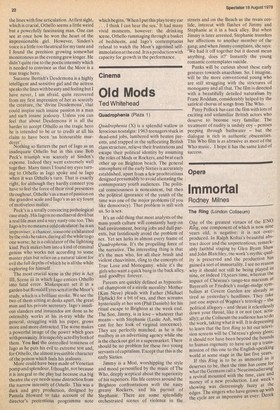Cinema
Old Mods
Ted Whitehead
Quadrophenia (Plaza 1) Quadrophenia (X) is a splendid wallow in ferocious nostalgia: 1963 teenagers stuck in dead-end jobs, lumbered with beaten parents, and trapped in the suffocating British class structure, relieve their frustrations and escape their political identity by assuming the roles of Mods or Rockers, and beat each other up on Brighton beach. The general atmosphere of the early Sixties is accurately established, apart from a few prochronisms designed presumably to avoid alienating the contemporary youth audiences. The political consciousness is nonexistent, but then the political ignorance of the youth of the time was one of the major problems (if you like democracy). That problem is still with us. So is sex.
It's an odd thing that most analysts of the mass youth culture will constantly harp on bad environment, boring jobs and dull parents, but fastidiously avoid the problem of sex. Yet sex lurks in almost every frame of Quadrophenia. It's the propelling force of the narrative. The interesting thing is that it's the men who, for all their brash and violent chauvinism, cling to the concepts of True Love and Monogamy, while it's the girls who want a quick bang in the back alley, and goodbye forever.
Parents are quickly defined as hypocritical champions of a sterile morality: Mother (Kim Neve) pleads with Father (Michael Elphick) for a bit of sex, and then screams hysterically at her son (Phil Daniels) for his ritual escape to Brighton at the week end. The Son, Jimmy, is in love — whatever that means — with Stephanie (Leslie Ash, wellcast for her look of virginal innocence). They are perfectly matched, as he is the rnailboy in an advertising agency while she is the checkout girl in a supermarket. There should be no problem for these two young servants of capitalism. Except that this is the early Sixties.
Jimmy is a Mod, worshipping the style and mood personified by the music of The Who, deeply sceptical about the superiority of his superiors. His life centres around the Brighton confrontations with the nasty greasy Rockers, and his pursuit of Stephanie. There are some splendidly orchestrated scenes of violence in the streets and on the Beach as the rivals collide, intercut with flashes of Jimmy and Stephanie at it in a back alley. But when Jimmy is later arrested, Stephanie transfers her affections to another member of the gang; and when Jimmy complains, she says: 'We had it off together but it doesnt mean anything, does it?' Instantly the young romantic contemplates suicide.
Punks will be curious about these early gestures towards anarchism. So, I imagine, will be the more conventional young who are still struggling with the strictures of monogamy and all that. The film is directed with a beautifully detailed naturalism by Franc Roddam, considerably helped by the satirical chorus of songs from The Who.
Patsy Pollock has cast the film with lots of exciting and unfamiliar British actors who deserve to become very familiar. The treatment of nudity is unduly coy — penises peeping through bathwater — but the dialogue is rich in authentic obscenities. This Who film is as abrasive as most of the Who music. I hope it has the same kind of success.






























 Previous page
Previous page